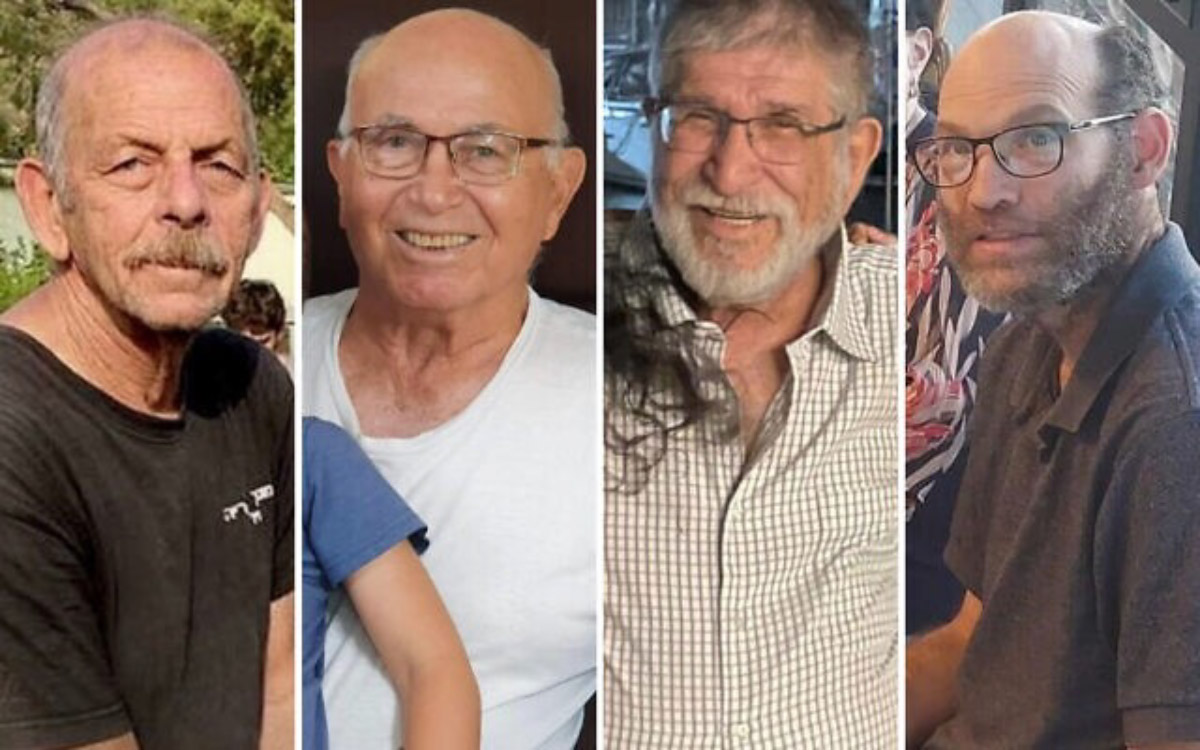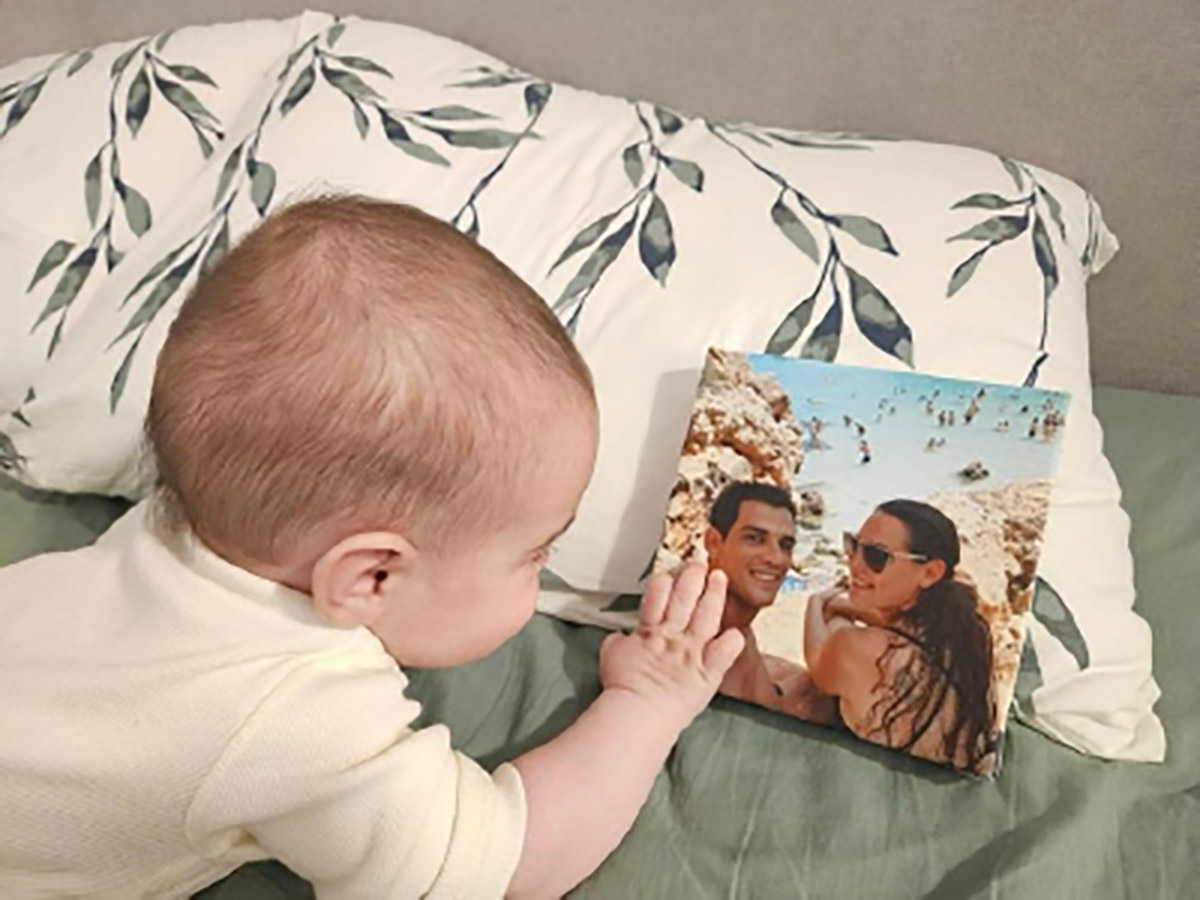By Leah Garber
”אל תשליכני לעת זקנה, ככלות כחי אל תעזבני“
“Do not cast me off in old age; when my strength fails, do not forsake me!”
Who, from time to time, does not sail in their imagination on quiet, trusting waters to their old age—whether those days are near or far away? Imagine how we would slow down, enjoy each day, travel, spend time on hobbies, and other things we never had time to do. Surrounded by our growing family and free from the need to care for them, we will finally lean back, hold hands in contentment, and whisper: “How blessed we are.” Surely no one wishes less than that for themselves.
Chaim, Amiram, and Yoram must have had such pleasant thoughts and plans for their golden years.

Eighty-year-old Chaim Peri, a father of five and grandfather of 13, was kidnapped on October 7 from his home in Kibbutz Nir Oz. Chaim was a sculptor and curator, a man of culture and art, who taught cinema in college. Chaim believed in humankind, reconciliation, and co-existence. He was a man of peace who, together with his wife, Osnat, frequently drove Gazan patients to hospitals in Israel.
On October 7, Chaim and Osnat were at their home in Nir Oz, probably enjoying early morning coffee on the quiet holiday morning and planning the day ahead with their family. Then came the howling sirens, piercing the air again and again, predicting the cries of the injured and bleeding, the tortured, and the silence of death that followed.
As they rushed into their safe room, a Hamas terrorist tried to open the door. Chaim resisted, and in an attempt to hit the terrorist, he forced opened the heavy door, causing the terrorist to fall. He knew the terrorist would come back to kill him so, in the few seconds he had, Chaim helped his wife hide behind a box, hoping to mislead the terrorist into thinking he was alone in the house. The terrorists came back, kidnapped Chaim, while, from her hiding place, Osnat watched as her 80-year-old husband was dragged outside their home by evil hands. On that same day, Chaim and Osnat’s son, Daniel, and his partner, Carolyn, were murdered.
Eighty-year-old Yoram Metzger, a father of three and grandfather of seven, along with his wife, Tamar, also was kidnapped from Kibbutz Nir Oz. Yoram was an excellent cook, a lover of history, and a wine expert. Even after his retirement, he continued to work in the kibbutz’s garage.
Eighty-four-year-old Amiram Cooper also was kidnapped with his wife, Nurit, from the same kibbutz. The couple, parents of three and grandparents of nine, were among the founders of Nir Oz. Nurit was among the first hostages to be released, knowing that her husband, an economist, poet, and composer, was in urgent need of life-saving medication—medication that he did not receive.
A pleasant old age—in the green, peaceful kibbutz they established and built—awaited all three of them, not far from the Palestinian neighbors with whom they believed they could live side by side in peace. But the enemy’s hatred and cruelty ended what could have been. All three were thrown, violently and under torture, into the tunnels of Gaza until, ultimately, they were murdered.
Last night, the army announced that solid evidence proves the men were killed in Khan Yunis about four months ago. They were kidnapped alive and healthy and videotaped by their murders while in captivity. Now, their souls are free and no longer facing evil, but their bodies remain in captivity.
Fifty-one-year-old Nadav Popplewell also was killed with the three older men—probably at the same time and place. Nadav was in the prime of his life when he was kidnapped from Kibbutz Nirim, located near Nir Oz. A professional in the computer field, Nadav enjoyed playing bridge and reading science fiction. Nadav’s mother, Hana Perry, also was kidnapped to Gaza and was released in the first hostage deal after 49 days in captivity. His brother, Roy, was murdered in the massacre.

Nadav Popplewell
The photos above—the Hamas-like beards, shaved heads, thin bodies, submissive postures, an eye injury, and the horror in all their eyes—tell the story of their captivity. They are as far as possible from the golden years they likely imagined for themselves.
Along with the devastating news of the men’s deaths, we also learned that 35-year-old Dolev Yehud has been declared dead. Originally thought to have been taken hostage by Hamas on October 7, his body was identified in Israel, not far from his home in Kibbutz Nir Oz.
As the war continued, there was no indication from Gaza that Dolev was among the hostages. In the absence of such information, Israeli authorities reevaluated unidentified remains found in the kibbutz after the massacre. New scientific identification tests paired with information on where the remains were found confirmed that a previously unidentified body, in fact, are Dolev’s remains.
Dolev was a volunteer medic. On the morning of October 7, he left his home to save others amid the Hamas attack, before he himself was killed. Since then, Dolev has been waiting for his body to be identified, buried, and his soul to have eternal rest. Mourning his death are his wife, Sigi, and their four children, the youngest of whom, Dor, was born a few weeks after her father’s murder and will never feel his loving touch. And, even as they mourn, they continue to pray for Dolev’s sister, Arbel, and her partner, Ariel, both of whom were kidnapped and have been held captive in Gaza for the last 242 days.

The monstrosity of the massacre and the barbarism with which it was carried out are revealed again and again through this unimaginable new evidence—telling and retelling the horror story of the longest and blackest night in our country’s history. Not only is time running out for the 124 hostages, but it is also running out for us, and for the moral character of the State of Israel, which is obligated to bring its citizens back home.
And while the eyes of the world are hypocritically on Rafah, has anyone bothered to look for our hostages?… Meanwhile, our eyes here in Israel are looking with great concern to Israel’s north, which, for the last eight months has been destroyed by enemy missiles. The entire beautiful region was to have been packed with tourists, campers, and visitors enjoying its serenity and peaceful landscapes this summer. Instead, it has been abandoned for 242 days, destroyed and burned, while the war with Hezbollah escalates daily.
On days like this, when the heat breaks records, when the number of missiles fired from Lebanon breaks records, and the degree of sadness has long since filled—and overflowed—our cup of agony, our hearts explode with pain, frustration, helplessness, and despair.
How much longer will the longest night in Israel’s history last? How much longer will it be so dark? When will a new dawn finally break, to illuminate, warm, and comfort us all?
Horrible news erodes our resilience. Learning about more and more hostages killed during captivity or murdered before they were kidnapped to Gaza crumbles the sliver of hope that remains with us. We have no strength left.
Together, united, we will overcome.
Leah Garber is a senior vice president of JCC Association of North America and director of its Center for Israel Engagement in Jerusalem.
Reader Interactions